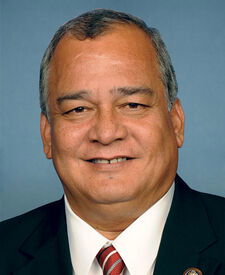U.S. Congressman Gregorio Kilili Camacho Sablan said the Commonwealth Ports Authority should explore other federal programs that could provide funding to support the air service on Rota and Tinian.
Kilili made the recommendation in response to a letter from CPA Chairwoman Kimberlyn King-Hinds who asked for his help in kick-starting federal programs that can improve the frequency and lower the cost of air service on Rota and Tinian.
Kilili said CPA should apply for the U.S. Department of Transportation’s Small Community Air Service Development Program.
In fiscal year 2019, he said, the program granted a total of $18 million to 22 small communities that do not receive sufficient air carrier service. “They are using this federal assistance to provide air carrier revenue guarantees and help with marketing programs, start-up costs, and business planning to improve service permanently,” the congressman said.
Kilili said he had informed CNMI legislators and then-Gov. Eloy Inos about the federal program in 2014.
The 18th CNMI Legislature then adopted Senate Joint Resolution 18-08 requesting the Office of the Governor to apply for a Small Community Air Service Development Program grant.
However, Kilili said, according to the U.S. Department of Transportation, the CNMI has never submitted a grant application for any of the three airports operated by CPA.
“I would once again respectfully recommend that you apply for these federal funds and share your application with me, so I can offer my support to the Department of Transportation,” Kilili stated in his letter to King-Hinds dated Dec. 14.
“I recognize that applying for grant funds takes time and resources. And because [the Small Community Air Service Development Program] is… competitive…, there is no guarantee of success. Nevertheless, Rota and Tinian meet the criteria for eligibility and CPA should at least try,” Kilili added.
In her Dec. 5 letter to Kilili, King-Hinds mentioned the Essential Air Service or EAS Program, saying “it is not uncommon for locations to be designated as full EAS communities through acts of Congress.”
But according to Kilili, though the U.S. Congress has occasionally modified EAS eligibility requirements, it has never designated a specific location or community as eligible for EAS.
He said Northern Marianas received EAS subsidies in the 1980s. Continental Air Micronesia, which provided air service to Rota in 1982 and in 1984, was a recipient of the subsidies, he added.
But CPA and the airlines allowed the subsidies to lapse, Kilili said.
“Because the Rota, Tinian, Saipan airports were no longer receiving subsidies, they became ineligible for future assistance when the FAA Modernization Reform Act [P.L. 112-95], scaled back the program nationwide in 2012. The law discontinued eligibility for the program for over 600 communities that were not receiving an EAS subsidy,” Kilili said.
The EAS program, he added, was established in the Airline Deregulation Act of 1978 or P.L. 95-504 to ensure that small U.S. communities, which had been served by certificated airlines prior to deregulation, maintained a certain level of commercial air service. Rota, Tinian, and Saipan were all designated as eligible communities in 1978.
But because the CNMI airports lost eligibility for the EAS program, they are also ineligible for the Alternate Essential Air Service Program, Kilili said.
He lauded King-Hinds for seeking a mediated resolution between CPA and Star Marianas Air, which has agreed to resume service on a charter basis, while mediation is under way.
Star Marianas Air has opposed CPA’s decision to increase airport fees and charges which the airline said are “not financially feasible.”

Gregorio Kilili Camacho Sablan











